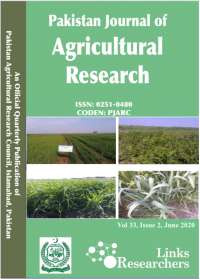Farmers’ Adaptation Strategies to Combat Climate Change Impacts on Wheat Crop in Pakistan
Farmers’ Adaptation Strategies to Combat Climate Change Impacts on Wheat Crop in Pakistan
Aisha Siddiqua1*, Munir Ahmad1 and Nusrat Habib2
ABSTRACT
This paper assesses the effectiveness of adaptation in enhancing the wheat yield in Pakistan, and incentives that promote adaptation to climate change. We perform a counterfactual analysis and Multinomial Endogenous Switching (MES) regression model to analyze and compare the impact of different adaptation strategies in isolation or in combination on yield. The primary data of ‘Climate Change Impact Survey 2012-13’ used for this purpose. Crop-specific strategies of change in the time of sowing, use of inorganic fertilizer, change in irrigation, and varietal change. Change in irrigation practice gave rise to the highest yield suggesting that this might be the necessary requirement to sustain wheat growth in Pakistan in future. Farmers are expected to receive significant positive benefits from the adaptation of the combination of strategies. Farmer’s adaptive capacity, farm size, access to credit and sources of information on climate change are significant drivers of adaptation to climate change.
To share on other social networks, click on any share button. What are these?







